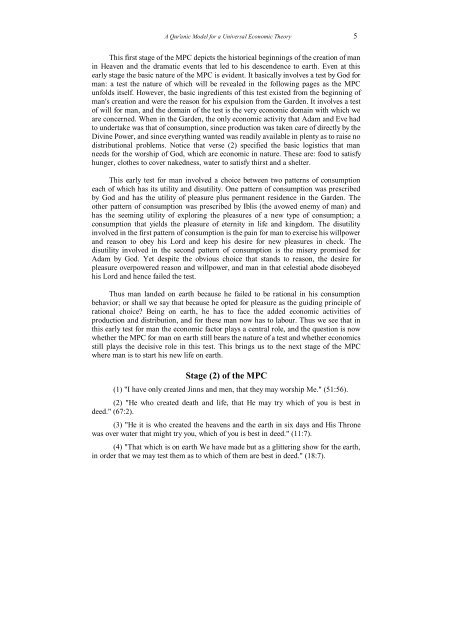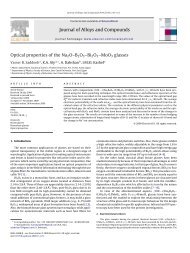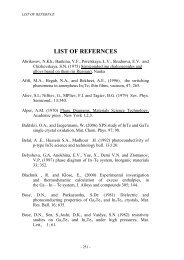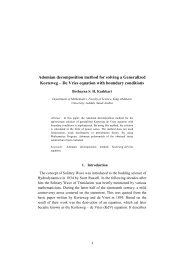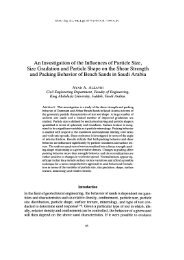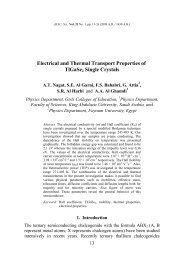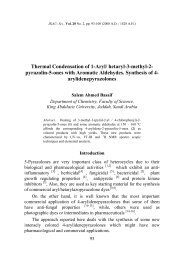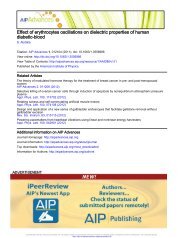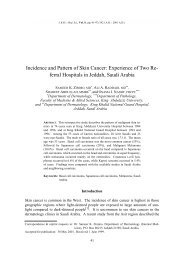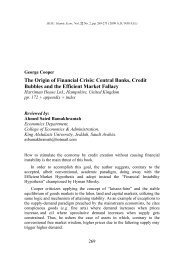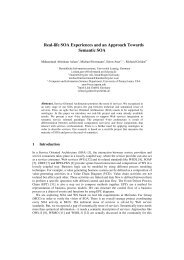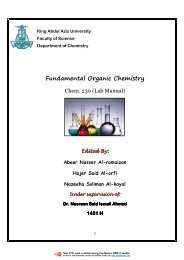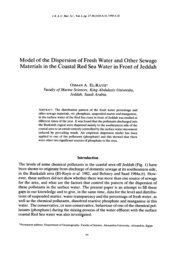A Qur'anic Model for a Universal Economic Theory
A Qur'anic Model for a Universal Economic Theory
A Qur'anic Model for a Universal Economic Theory
Create successful ePaper yourself
Turn your PDF publications into a flip-book with our unique Google optimized e-Paper software.
A Qur’anic <strong>Model</strong> <strong>for</strong> a <strong>Universal</strong> <strong>Economic</strong> <strong>Theory</strong> 5<br />
This first stage of the MPC depicts the historical beginnings of the creation of man<br />
in Heaven and the dramatic events that led to his descendence to earth. Even at this<br />
early stage the basic nature of the MPC is evident. It basically involves a test by God <strong>for</strong><br />
man: a test the nature of which will be revealed in the following pages as the MPC<br />
unfolds itself. However, the basic ingredients of this test existed from the beginning of<br />
man's creation and were the reason <strong>for</strong> his expulsion from the Garden. It involves a test<br />
of will <strong>for</strong> man, and the domain of the test is the very economic domain with which we<br />
are concerned. When in the Garden, the only economic activity that Adam and Eve had<br />
to undertake was that of consumption, since production was taken care of directly by the<br />
Divine Power, and since everything wanted was readily available in plenty as to raise no<br />
distributional problems. Notice that verse (2) specified the basic logistics that man<br />
needs <strong>for</strong> the worship of God, which are economic in nature. These are: food to satisfy<br />
hunger, clothes to cover nakedness, water to satisfy thirst and a shelter.<br />
This early test <strong>for</strong> man involved a choice between two patterns of consumption<br />
each of which has its utility and disutility. One pattern of consumption was prescribed<br />
by God and has the utility of pleasure plus permanent residence in the Garden. The<br />
other pattern of consumption was prescribed by Iblis (the avowed enemy of man) and<br />
has the seeming utility of exploring the pleasures of a new type of consumption; a<br />
consumption that yields the pleasure of eternity in life and kingdom. The disutility<br />
involved in the first pattern of consumption is the pain <strong>for</strong> man to exercise his willpower<br />
and reason to obey his Lord and keep his desire <strong>for</strong> new pleasures in check. The<br />
disutility involved in the second pattern of consumption is the misery promised <strong>for</strong><br />
Adam by God. Yet despite the obvious choice that stands to reason, the desire <strong>for</strong><br />
pleasure overpowered reason and willpower, and man in that celestial abode disobeyed<br />
his Lord and hence failed the test.<br />
Thus man landed on earth because he failed to be rational in his consumption<br />
behavior; or shall we say that because he opted <strong>for</strong> pleasure as the guiding principle of<br />
rational choice? Being on earth, he has to face the added economic activities of<br />
production and distribution, and <strong>for</strong> these man now has to labour. Thus we see that in<br />
this early test <strong>for</strong> man the economic factor plays a central role, and the question is now<br />
whether the MPC <strong>for</strong> man on earth still bears the nature of a test and whether economics<br />
still plays the decisive role in this test. This brings us to the next stage of the MPC<br />
where man is to start his new life on earth.<br />
Stage (2) of the MPC<br />
(1) "I have only created Jinns and men, that they may worship Me." (51:56).<br />
(2) "He who created death and life, that He may try which of you is best in<br />
deed." (67:2).<br />
(3) "He it is who created the heavens and the earth in six days and His Throne<br />
was over water that might try you, which of you is best in deed." (11:7).<br />
(4) "That which is on earth We have made but as a glittering show <strong>for</strong> the earth,<br />
in order that we may test them as to which of them are best in deed." (18:7).


